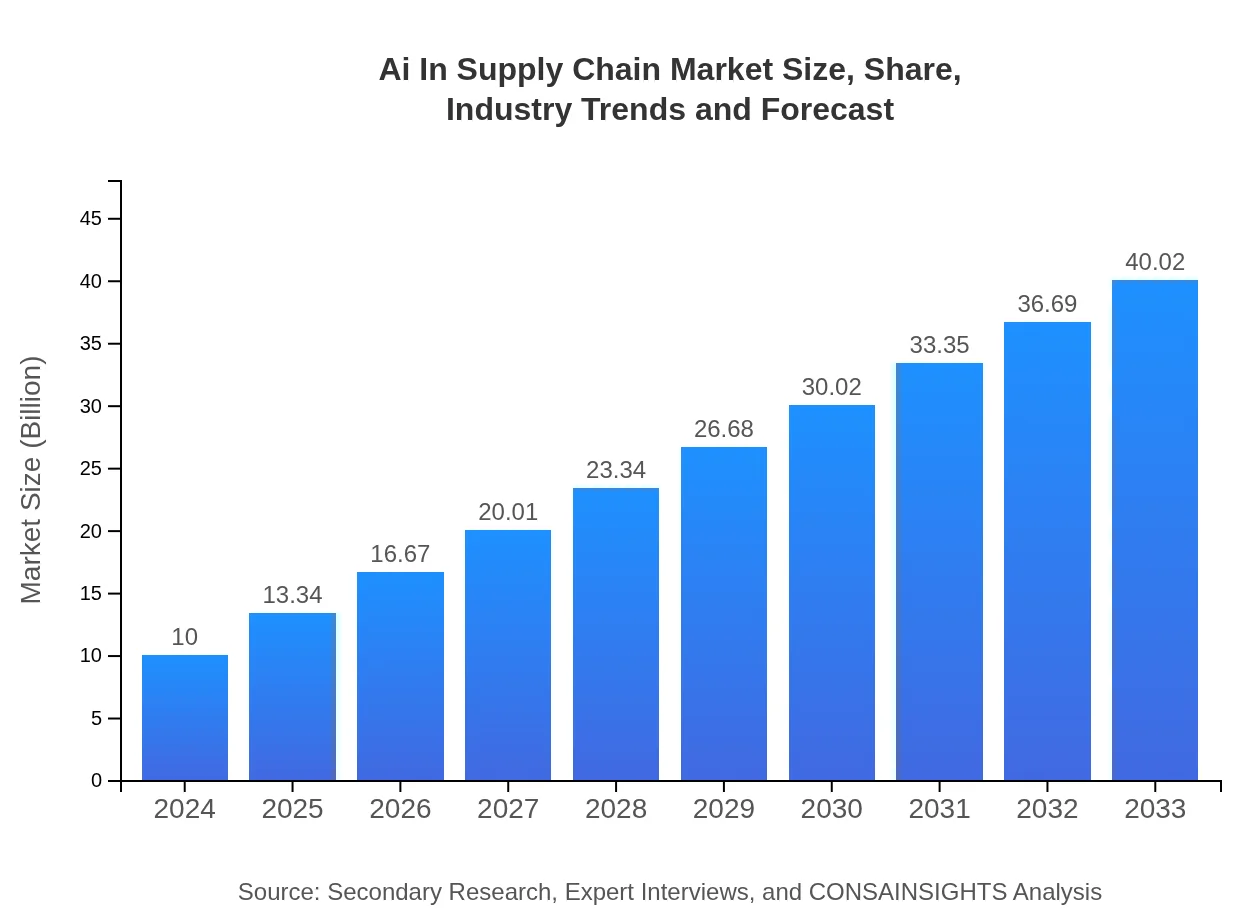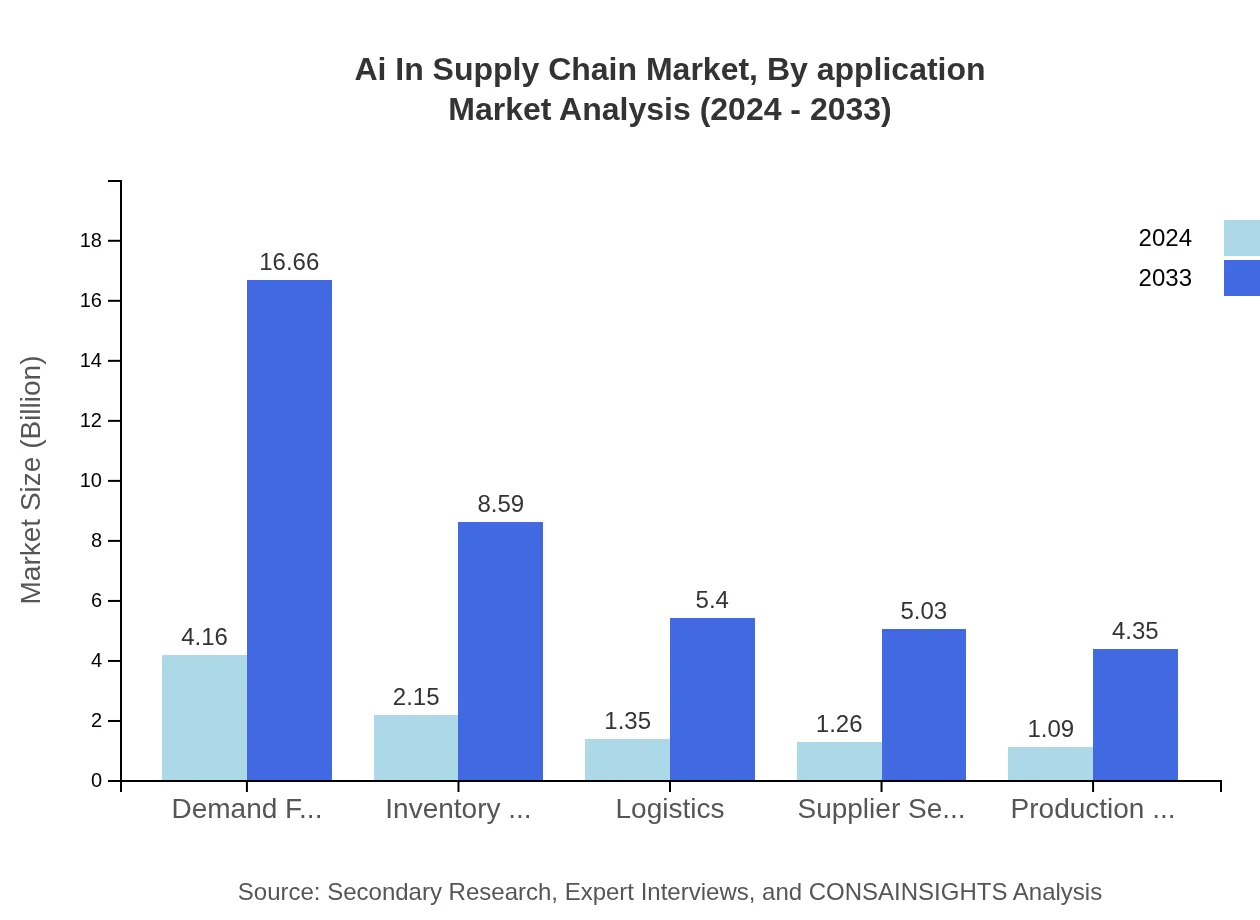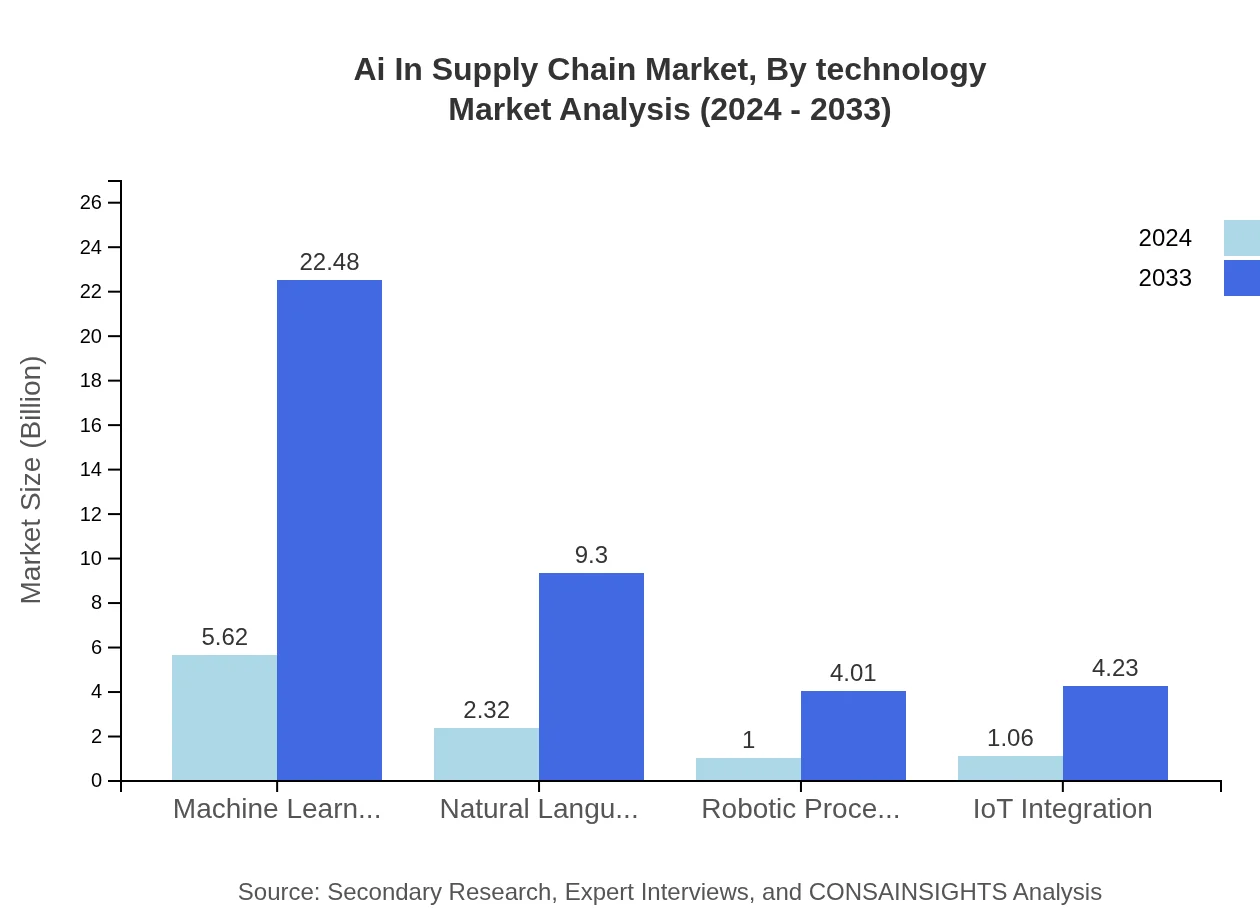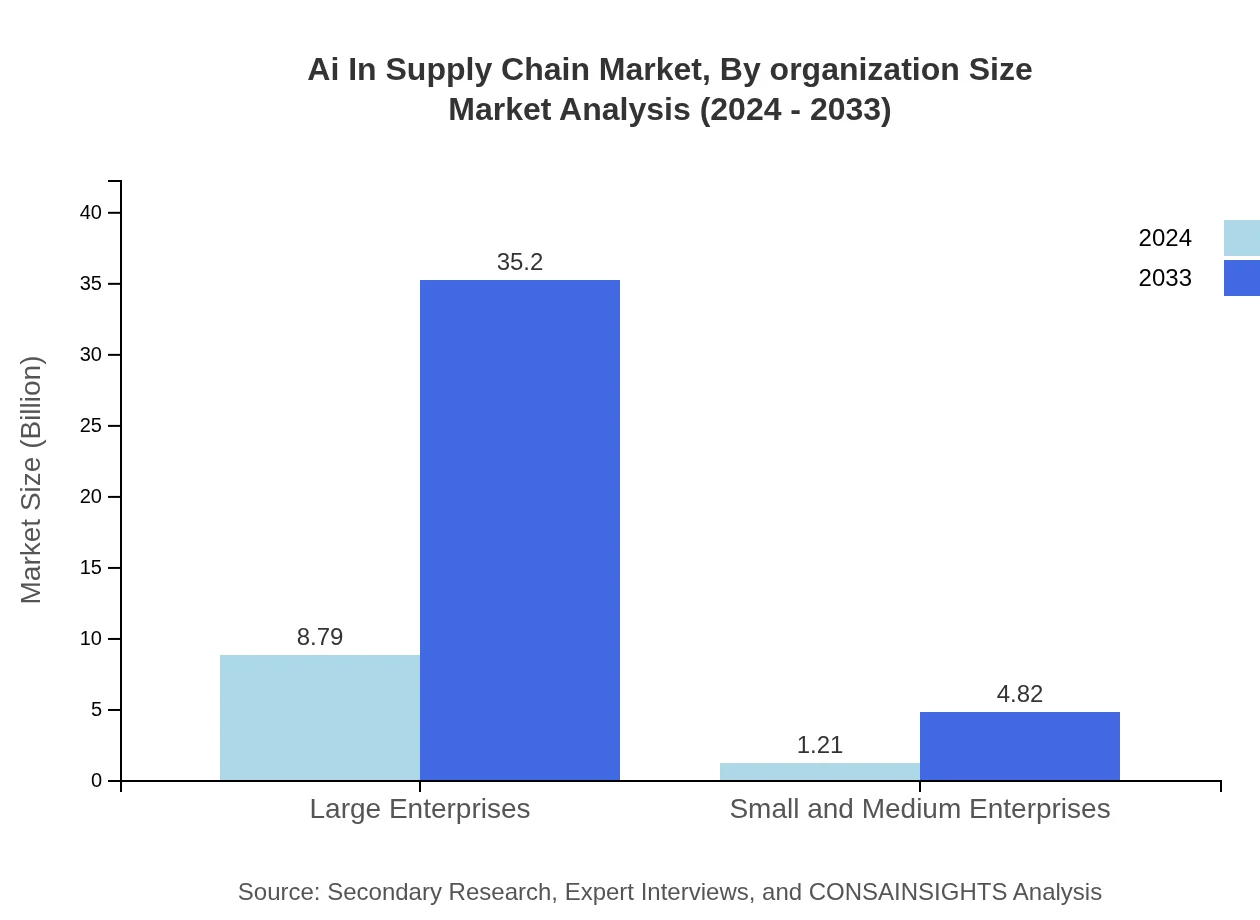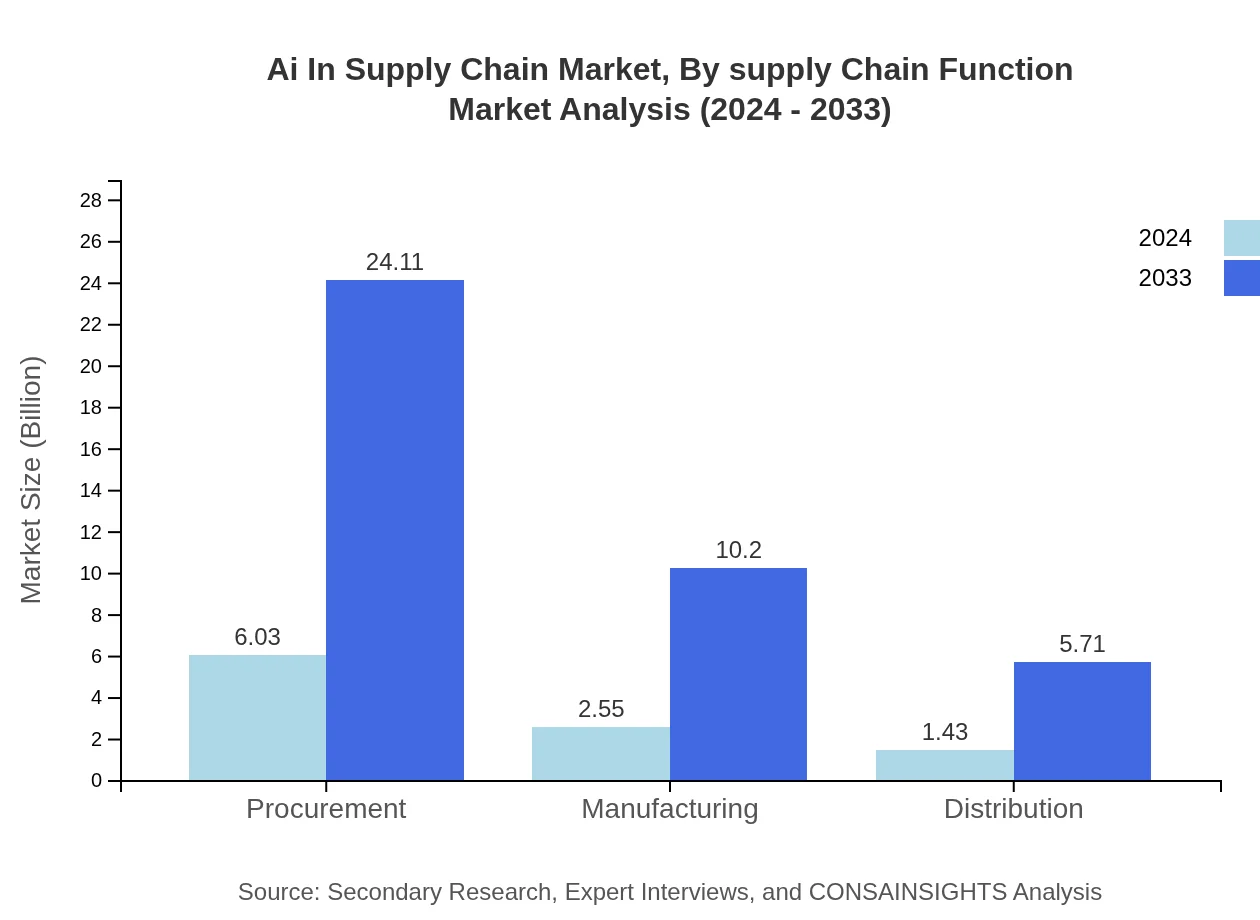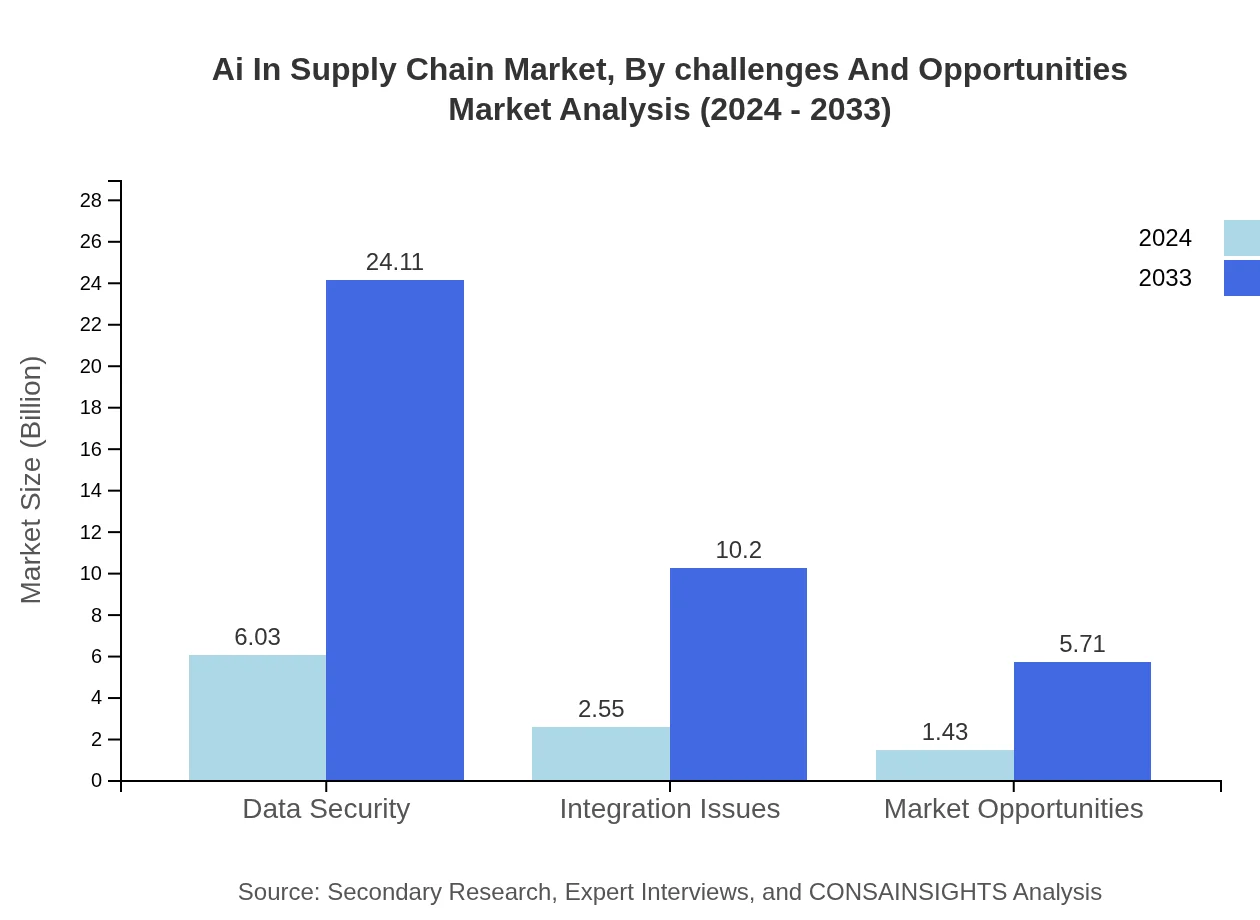Ai In Supply Chain
Published Date: 02 February 2026 | Report Code: ai-in-supply-chain
Ai In Supply Chain Market Size, Share, Industry Trends and Forecast to 2033
This report provides an in‐depth analysis of the Ai In Supply Chain market, capturing detailed insights from 2024 to 2033. It examines current market conditions, forecast trends, technological innovations, and segmentation data. By combining quantitative metrics with qualitative insights, the report offers stakeholders the critical data needed for strategic decision-making and growth planning.
| Metric | Value |
|---|---|
| Study Period | 2024 - 2033 |
| 2024 Market Size | $10.00 Billion |
| CAGR (2024-2033) | 15.8% |
| 2033 Market Size | $40.02 Billion |
| Top Companies | IBM, SAP, Oracle |
| Last Modified Date | 02 February 2026 |
Ai In Supply Chain Market Overview
Customize Ai In Supply Chain market research report
- ✔ Get in-depth analysis of Ai In Supply Chain market size, growth, and forecasts.
- ✔ Understand Ai In Supply Chain's regional dynamics and industry-specific trends.
- ✔ Identify potential applications, end-user demand, and growth segments in Ai In Supply Chain
What is the Market Size & CAGR of Ai In Supply Chain market in 2024?
Ai In Supply Chain Industry Analysis
Ai In Supply Chain Market Segmentation and Scope
Tell us your focus area and get a customized research report.
Ai In Supply Chain Market Analysis Report by Region
Europe Ai In Supply Chain:
Europe's market is expanding significantly, as indicated by the growth from 3.04 in 2024 to 12.19 by 2033. Strategic investments in AI research, government initiatives, and a focus on sustainability and efficiency are propelling the region forward, making it a competitive hub for AI-driven supply chain solutions.Asia Pacific Ai In Supply Chain:
In the Asia Pacific region, the market is experiencing impressive growth as companies progressively harness AI for supply chain optimization. The 2024 market size was valued at approximately 1.99, growing to 7.94 by 2033. Rapid industrialization, increased digital adoption, and government support for technology initiatives are driving this expansion, although infrastructure challenges and skill gaps persist.North America Ai In Supply Chain:
North America remains a front-runner with a market size that expanded from 3.35 in 2024 to 13.41 by 2033. The region benefits from advanced technological ecosystems, strong R&D capabilities, and a high degree of digital integration in business operations, paving the way for innovative supply chain solutions.South America Ai In Supply Chain:
South America shows a promising yet emerging landscape for AI in supply chain applications. With a market size increasing from 0.41 in 2024 to 1.62 by 2033, the region is focusing on leveraging AI to improve logistics and operational efficiency. Investment in digital infrastructure and technology upskilling is crucial for sustaining this growth.Middle East & Africa Ai In Supply Chain:
The Middle East and Africa region is gradually integrating AI into supply chains, with market size estimates growing from 1.21 in 2024 to 4.86 by 2033. Although challenges related to infrastructure and regulatory environments exist, increased investment in technology and a focus on innovation are contributing positively to market development.Tell us your focus area and get a customized research report.
Ai In Supply Chain Market Analysis By Application
The by-application segment covers critical areas such as demand forecasting, production planning, and inventory management. With demand forecasting growing from 4.16 to 16.66 over the forecast period, and inventory management witnessing growth from 2.15 to 8.59, these applications are pivotal in enhancing supply chain responsiveness and reducing operational redundancies. This segment underscores the strategic importance of using AI to gain real-time insights and facilitate proactive decision-making.
Ai In Supply Chain Market Analysis By Technology
Technological integration remains at the core of market transformation. Machine learning leads the technological segment with market sizes expanding from 5.62 to 22.48, consistently holding a 56.17% share. Natural language processing is also significant, growing from 2.32 to 9.30 with a steady share of 23.23%. In addition, robotic process automation and IoT integration are vital, enhancing process automation and connectivity across supply chains. These trends illustrate a robust technological evolution driving efficiency and innovation.
Ai In Supply Chain Market Analysis By Organization Size
Large enterprises currently dominate the AI adoption in supply chain strategies, with market values rising from 8.79 to 35.20 and capturing an 87.95% share. Conversely, small and medium enterprises are gradually increasing their investments, observed by a market size growth from 1.21 to 4.82. This segmentation highlights the varying capacities and resource allocations between larger corporations and smaller firms, emphasizing the need for tailored AI solutions that address distinct operational scales and integration challenges.
Ai In Supply Chain Market Analysis By Supply Chain Function
The supply chain function segment includes key areas such as procurement, manufacturing, distribution, logistics, supplier selection, and production planning. For instance, procurement has shown substantial growth from 6.03 to 24.11, while manufacturing expands from 2.55 to 10.20. This analysis highlights how AI applications optimize each function, driving overall process improvements through enhanced data analytics, streamlined operations, and better resource management, ultimately leading to increased competitive advantage.
Ai In Supply Chain Market Analysis By Challenges And Opportunities
This segment addresses both the hurdles and potential areas for growth within the AI supply chain market. Challenges such as data security, integration issues, and market readiness are critical, with data security growing from 6.03 to 24.11 and integration issues from 2.55 to 10.20. However, these challenges are complemented by significant market opportunities that enable companies to overcome constraints. Market opportunities, quantified by a growth from 1.43 to 5.71, emphasize the potential of AI to revolutionize operational frameworks if adequate investments in technology and process streamlining are maintained.
Ai In Supply Chain Market Trends and Future Forecast
Tell us your focus area and get a customized research report.
Global Market Leaders and Top Companies in Ai In Supply Chain Industry
IBM:
IBM stands at the forefront of integrating AI into supply chain management. Their cutting-edge analytics, cloud-based solutions, and comprehensive AI platforms provide scalable and secure solutions for global enterprises. IBM’s focus on continuous innovation and strategic partnerships has enabled it to maintain a leading position in the market.SAP:
SAP is recognized for its robust enterprise resource planning and AI-enhanced supply chain solutions. With a strong emphasis on real-time data processing and predictive analytics, SAP drives efficiency and agility across supply chains, effectively supporting both large and mid-sized organizations through advanced technological integration.Oracle:
Oracle leverages its extensive experience in database management and cloud computing to offer innovative AI-driven supply chain solutions. Oracle’s strategic focus on end-to-end integration and real-time analytics helps organizations optimize inventory, logistics, and overall operational performance, ensuring resilience in a competitive market.We're grateful to work with incredible clients.









FAQs
What is the market size of AI in Supply Chain?
The AI in Supply Chain market is projected to reach approximately $10 billion by 2024, with a significant growth rate expected, boasting a CAGR of 15.8% from 2024 to 2033.
What are the key market players or companies in this AI in Supply Chain industry?
Key players in the AI in Supply Chain market include major technology companies specializing in AI and supply chain management solutions, which develop innovative technologies that enhance operational efficiency and data visibility.
What are the primary factors driving the growth in the AI in Supply Chain industry?
The primary growth drivers for the AI in Supply Chain industry include increased demand for automation, enhanced data analytics capabilities, the need for effective inventory management, and a growing emphasis on optimizing logistics and supplier relationships.
Which region is the fastest Growing in the AI in Supply Chain?
North America is anticipated to be the fastest-growing region in the AI in Supply Chain market, projected to expand from $3.35 billion in 2024 to $13.41 billion by 2033, highlighting a robust demand for AI solutions.
Does ConsaInsights provide customized market report data for the AI in Supply Chain industry?
Yes, ConsaInsights offers customized market report data tailored to specific needs in the AI in Supply Chain industry, ensuring comprehensive insights that cater to unique business requirements.
What deliverables can I expect from this AI in Supply Chain market research project?
Deliverables from the AI in Supply Chain market research project include detailed market analysis reports, segmentation data, regional insights, competitive landscape evaluations, and actionable strategic recommendations.
What are the market trends of AI in Supply Chain?
Market trends in AI in Supply Chain indicate a strong shift towards machine learning and data security, with growing applications in predictive analytics, demand forecasting, and IoT integration, shaping future operational practices.

